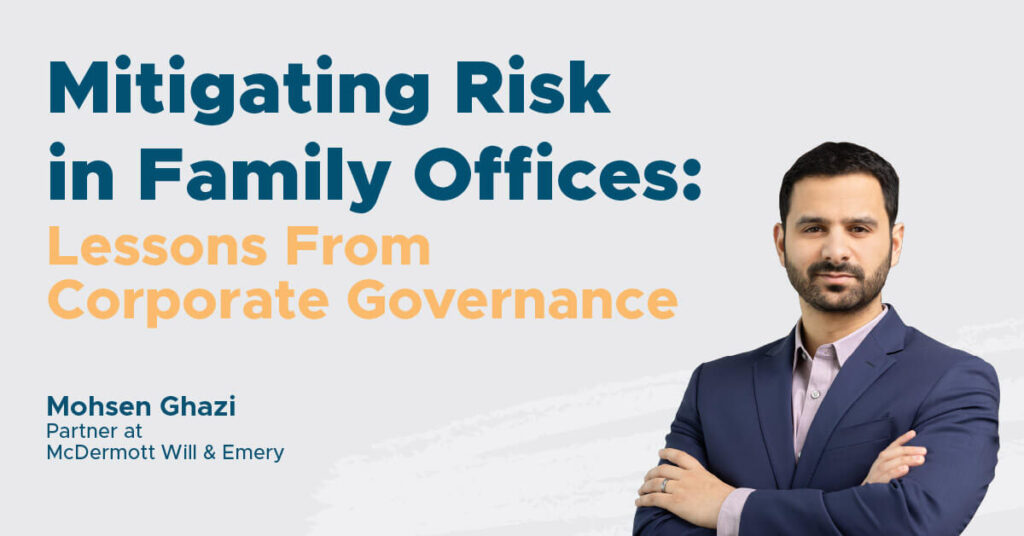
By Mohsen Ghazi, Partner at McDermott Will & Emery
Family offices are unique entities that blend the complexities of family dynamics with the challenges of running a successful business. Like corporations, they face myriad risks that can threaten their long-term stability and success. However, as the number and size of family offices grow—with global assets under management surpassing $6 trillion in 2024—adopting corporate governance principles can help families navigate these challenges more effectively.
To understand these risks, it is helpful to think of a family office as a corporation. Family members are the shareholders, a subset of family and non-family members acts as the board, and the management team includes both family and external executives. Like any business, family offices must manage vendor risk, cyber risk, and employee issues. But they also face unique risks rooted in family dynamics, such as disputes between active and passive shareholders, diverging generational values, and personal conflicts spilling into operational decisions.
For example, consider a family office where the second generation advocates for ESG-focused investments, prioritizing sustainability and impact, while the older generation remains focused on maximizing financial returns through traditional private equity strategies. This divide not only creates tension but can also delay critical investment decisions, potentially causing the family to miss out on key opportunities. The key to success is finding ways to turn a tug-of-war into an opportunity for creative problem solving. For example, in this situation the family could leverage tax-efficient structures, such as private foundation program-related investments (PRIs), to help bridge this divide. PRIs can be structured to allow families to pursue mission-aligned investments in a way that satisfies the financial and philanthropic goals of different generations, mitigating disputes and preserving alignment.
The cornerstone of mitigating these risks lies in adopting robust governance frameworks. Establishing clear policies—such as decision-making charters, shareholder agreements, and succession plans—before conflicts arise ensures that the family office operates as a neutral steward of wealth, not a battleground for competing interests. Importantly, governance frameworks must be perceived as fair and objective to all parties; otherwise, they risk being viewed as tools for political maneuvering rather than genuine solutions.
Transparency and communication are equally critical. Proactive engagement with family members at all levels, including passive shareholders, can foster trust and alignment. Regular family meetings, open dialogues, and shared performance updates ensure that everyone remains informed and connected, regardless of their involvement in day-to-day operations. This approach can prevent misunderstandings and foster a shared sense of purpose, especially as the office evolves across generations.
In successful family offices, the family recognizes that it exists in service of the enterprise, not the other way around; the enterprise can be an operating company or the family office itself. This mindset ensures that decisions are made with the long-term health and prosperity of the office in mind, rather than catering to short-term preferences or individual interests. Maintaining this perspective allows family offices to navigate challenges more effectively and sustain their legacy across generations.
Ultimately, the enduring success of a family office is about more than just financial returns—it’s about preserving and building upon a legacy that reflects the family’s core values. By learning from corporate governance best practices, such as structured decision-making, transparency, and inclusive engagement, family offices can mitigate risks and build a strong foundation for multi-generational success. These principles, combined with proactive planning and a focus on long-term impact, are essential for ensuring that the family office thrives as both a business and a steward of the family’s legacy.
Contact Cresset to explore corporate governance strategies that can help mitigate risks and preserve your family’s legacy.
About Cresset
Cresset is an independent, award-winning multi-family office and private investment firm with more than $235 billion in assets under management and advisement (as of 10/31/2025). Cresset serves the unique needs of entrepreneurs, CEO founders, wealth creators, executives, and partners, as well as high-net-worth and multi-generational families. Our goal is to deliver a new paradigm for wealth management, giving you time to pursue what matters to you most.
https://cressetcapital.com/disclosures/
